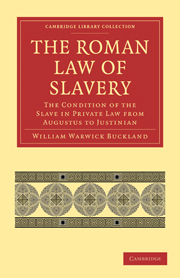Book contents
- Frontmatter
- PREFACE
- Contents
- ERRATA, ADDENDA, AND LIST OF ABBREVIATIONS
- LIST OF PRINCIPAL ABBREVIATIONS
- PART I CONDITION OF THE SLAVE
- PART II ENSLAVEMENT AND RELEASE FROM SLAVERY
- CHAPTER XVII Enslavement
- CHAPTER XVIII Enslavement (cont.)
- CHAPTER XIX Outline of Law of Manumission during the Republic
- CHAPTER XX Manumission during the Empire. Forms
- CHAPTER XXI Manumission during the Empire (cont.). Manumission by Will (cont.). Dies, Conditio, Institutio
- CHAPTER XXII Manumission during the Empire (cont.). Fideicommissary Gifts
- CHAPTER XXIII Manumission during the Empire (cont.). Statutory Changes
- CHAPTER XXIV Manumission under Justinian
- CHAPTER XXV Manumission. Special Cases and Minor Restrictions
- CHAPTER XXVI Freedom independent of Manumission
- CHAPTER XXVII Freedom without Manumission. Uncompleted Manumission
- CHAPTER XXVIII Questions of Status as affected by Lapse of Time, Death, Judicial Decision, etc.
- CHAPTER XXIX Effect after Manumission of Events during Slavery. Obligatio Naturalis
- APPENDIX I The relation of the contractual actions adiectitiae qualitatis to the Theory of Representation
- APPENDIX II Formulation and Litis Consumptio in the actions adiectitiae qualitatis
- APPENDIX III Form used by Slave in acquisition by Mancipatio, etc.
- APPENDIX IV The essential character of Manumission: Iteratio
- APPENDIX V Manumission vindicta by a, filiusfamilias
- INDEX
CHAPTER XXVI - Freedom independent of Manumission
Published online by Cambridge University Press: 07 September 2010
- Frontmatter
- PREFACE
- Contents
- ERRATA, ADDENDA, AND LIST OF ABBREVIATIONS
- LIST OF PRINCIPAL ABBREVIATIONS
- PART I CONDITION OF THE SLAVE
- PART II ENSLAVEMENT AND RELEASE FROM SLAVERY
- CHAPTER XVII Enslavement
- CHAPTER XVIII Enslavement (cont.)
- CHAPTER XIX Outline of Law of Manumission during the Republic
- CHAPTER XX Manumission during the Empire. Forms
- CHAPTER XXI Manumission during the Empire (cont.). Manumission by Will (cont.). Dies, Conditio, Institutio
- CHAPTER XXII Manumission during the Empire (cont.). Fideicommissary Gifts
- CHAPTER XXIII Manumission during the Empire (cont.). Statutory Changes
- CHAPTER XXIV Manumission under Justinian
- CHAPTER XXV Manumission. Special Cases and Minor Restrictions
- CHAPTER XXVI Freedom independent of Manumission
- CHAPTER XXVII Freedom without Manumission. Uncompleted Manumission
- CHAPTER XXVIII Questions of Status as affected by Lapse of Time, Death, Judicial Decision, etc.
- CHAPTER XXIX Effect after Manumission of Events during Slavery. Obligatio Naturalis
- APPENDIX I The relation of the contractual actions adiectitiae qualitatis to the Theory of Representation
- APPENDIX II Formulation and Litis Consumptio in the actions adiectitiae qualitatis
- APPENDIX III Form used by Slave in acquisition by Mancipatio, etc.
- APPENDIX IV The essential character of Manumission: Iteratio
- APPENDIX V Manumission vindicta by a, filiusfamilias
- INDEX
Summary
These cases may be most conveniently discussed under three heads. (i) Cases of reward to slaves. In relation to this matter it should be observed that these are cases in which the State intervenes to give liberty to the slaves of private persons, usually, as a matter of course, compensating the former owners. We have already considered some such cases, and assumed that the effect of the transaction with the owner was to vest the ownership in the State so that the act may be regarded as a manumission. It is not, however, clear that this is in all cases a correct analysis of the transaction. It is possible for the State by an overriding decree to give liberty to a slave who does not belong to it. We have seen such a case in connexion with servi poenae. The cases shortly to be considered in which liberty is given in excess of any possible interpretation of the testator's intent, are not essentially different. The cases in which freedom is given as a punishment to the master can be explained only in the same way. These are of course legislative acts, but it is not clear that such things would have been beyond the administrative powers of the republican Senate and the magistrate even though the slave was not the property of the State. It is true that the Senate cannot make grants of civitas, but this is an equal difficulty if the transaction be regarded as a manumission.
- Type
- Chapter
- Information
- The Roman Law of SlaveryThe Condition of the Slave in Private Law from Augustus to Justinian, pp. 598 - 608Publisher: Cambridge University PressPrint publication year: 2010First published in: 1908



